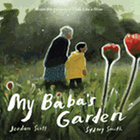
For I Talk Like a River, writer Jordan Scott and illustrator Sydney Smith collaborated on a picture book about a boy who stutters. Their subdued but heart-tugging follow-up, My Baba's Garden, presents another scenario in which a straight-ahead verbal exchange isn't possible. In this case, the workaround is both sufficient for communication and meaningful to the kid telling the story.
Every morning, the narrator's father drives him to see his grandmother, Baba, who "lives in a chicken coop beside a highway"; the boy always finds her in the kitchen. Baba serves him the same breakfast each morning then walks her grandson to school. When it's raining, she walks slowly because she's looking for worms, which she puts in a dirt-filled jar she keeps in her pocket. After school, Baba is always there to walk her grandson back to her house, stopping first to put the worms in her garden. After a big change comes, the narrator improvises a new version of their old rituals, with roles reversed.
In an author's note, Scott explains that Baba is based on his Polish-born grandmother, who never learned much English; as a boy, he communicated with her "through gesture, touch, and laughter." Smith's dense watercolor and gouache art has a shimmery, textured richness, and light features prominently in both outdoor and indoor scenes. My Baba's Garden hints at themes like immigration, poverty, loss and the end of life, but the narrative works beautifully at its most basic level: it's a love letter from a grandchild to a grandparent. --Nell Beram, freelance writer and YA author

